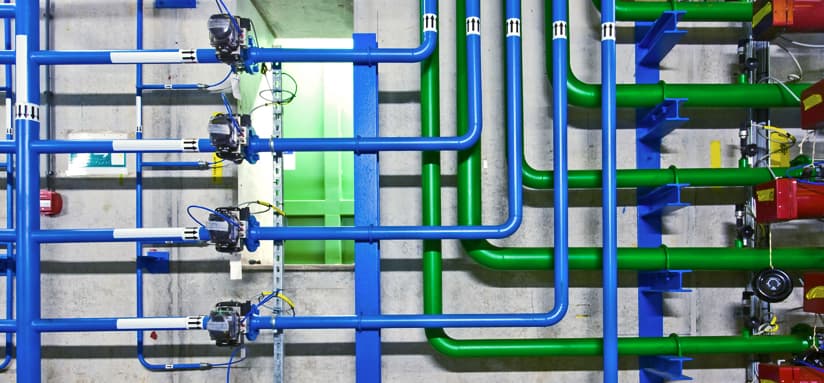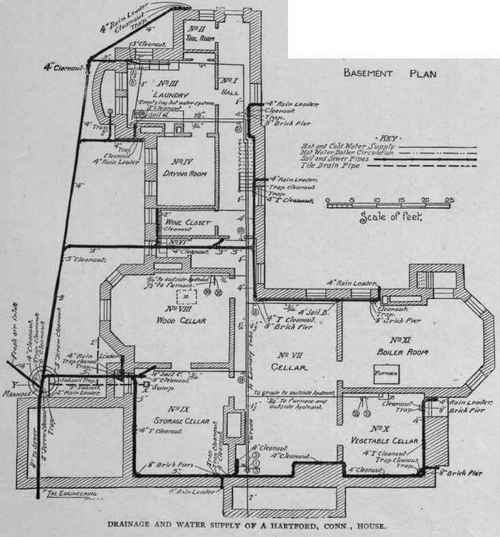How The Structure of Your House's Plumbing System Matters
How The Structure of Your House's Plumbing System Matters
Blog Article
What're your thoughts with regards to The Inner Workings of Your Home's Plumbing?

Recognizing just how your home's pipes system functions is necessary for each house owner. From providing clean water for drinking, cooking, and bathing to safely removing wastewater, a properly maintained pipes system is critical for your household's health and convenience. In this detailed guide, we'll explore the intricate network that makes up your home's pipes and deal ideas on maintenance, upgrades, and dealing with common problems.
Introduction
Your home's plumbing system is greater than simply a network of pipes; it's a complex system that guarantees you have accessibility to clean water and effective wastewater elimination. Understanding its components and just how they interact can assist you avoid costly fixings and make sure whatever runs smoothly.
Standard Parts of a Plumbing System
Pipelines and Tubes
At the heart of your plumbing system are the pipes and tubes that bring water throughout your home. These can be made of numerous materials such as copper, PVC, or PEX, each with its advantages in regards to sturdiness and cost-effectiveness.
Fixtures: Sinks, Toilets, Showers, and so on.
Fixtures like sinks, toilets, showers, and bath tubs are where water is utilized in your home. Recognizing exactly how these components link to the plumbing system assists in diagnosing issues and planning upgrades.
Shutoffs and Shut-off Points
Shutoffs manage the circulation of water in your plumbing system. Shut-off valves are vital during emergency situations or when you need to make repairs, enabling you to isolate parts of the system without interfering with water flow to the entire home.
Water Supply System
Key Water Line
The main water line attaches your home to the community water or a personal well. It's where water enters your home and is dispersed to various components.
Water Meter and Pressure Regulatory Authority
The water meter measures your water use, while a stress regulator makes certain that water streams at a secure pressure throughout your home's pipes system, preventing damages to pipelines and fixtures.
Cold Water vs. Warm water Lines
Understanding the difference in between cold water lines, which supply water directly from the primary, and warm water lines, which bring warmed water from the water heater, assists in repairing and planning for upgrades.
Drain System
Drain Pipes Pipeline and Traps
Drain pipelines carry wastewater away from sinks, showers, and commodes to the sewer or sewage-disposal tank. Traps protect against sewer gases from entering your home and likewise catch debris that might create clogs.
Ventilation Pipelines
Air flow pipes enable air into the drain system, stopping suction that could slow drain and create traps to empty. Appropriate air flow is essential for maintaining the stability of your pipes system.
Relevance of Proper Drain
Making sure correct drainage avoids backups and water damages. Consistently cleaning drains and preserving catches can stop pricey repairs and extend the life of your plumbing system.
Water Heating Unit
Kinds Of Hot Water Heater
Hot water heater can be tankless or typical tank-style. Tankless heaters heat water on demand, while tanks keep heated water for instant use.
Updating Your Pipes System
Factors for Updating
Updating to water-efficient components or changing old pipelines can boost water top quality, lower water costs, and raise the worth of your home.
Modern Pipes Technologies and Their Advantages
Discover modern technologies like clever leakage detectors, water-saving commodes, and energy-efficient hot water heater that can conserve cash and decrease environmental effect.
Expense Considerations and ROI
Calculate the upfront costs versus long-term savings when considering pipes upgrades. Numerous upgrades pay for themselves through reduced utility costs and less fixings.
Just How Water Heaters Link to the Plumbing System
Comprehending how water heaters connect to both the cold water supply and warm water circulation lines assists in identifying issues like inadequate hot water or leaks.
Upkeep Tips for Water Heaters
Consistently purging your water heater to remove sediment, inspecting the temperature setups, and examining for leaks can prolong its life expectancy and improve energy efficiency.
Common Pipes Issues
Leakages and Their Reasons
Leakages can happen because of aging pipes, loose fittings, or high water pressure. Addressing leakages immediately avoids water damage and mold and mildew growth.
Clogs and Clogs
Blockages in drains and commodes are typically brought on by flushing non-flushable items or a build-up of grease and hair. Using drainpipe screens and bearing in mind what goes down your drains pipes can stop blockages.
Signs of Pipes Troubles to Look For
Low water stress, slow-moving drains, foul odors, or unusually high water bills are indicators of prospective plumbing troubles that must be dealt with without delay.
Plumbing Upkeep Tips
Routine Evaluations and Checks
Set up annual pipes assessments to catch issues early. Try to find indications of leaks, rust, or mineral buildup in taps and showerheads.
Do It Yourself Maintenance Tasks
Basic tasks like cleansing faucet aerators, looking for bathroom leaks making use of dye tablet computers, or protecting exposed pipelines in cool climates can prevent significant plumbing concerns.
When to Call a Professional Plumbing Professional
Know when a pipes concern needs specialist competence. Attempting complicated repairs without correct knowledge can bring about more damage and greater repair work prices.
Tips for Decreasing Water Use
Easy behaviors like repairing leakages quickly, taking much shorter showers, and running full tons of washing and meals can preserve water and lower your energy costs.
Eco-Friendly Plumbing Options
Take into consideration sustainable plumbing materials like bamboo for flooring, which is durable and environmentally friendly, or recycled glass for countertops.
Emergency Preparedness
Steps to Take During a Pipes Emergency situation
Know where your shut-off shutoffs lie and exactly how to shut off the water system in case of a ruptured pipeline or significant leakage.
Relevance of Having Emergency Situation Calls Helpful
Maintain get in touch with info for regional plumbing technicians or emergency services conveniently offered for quick reaction during a plumbing situation.
Ecological Influence and Preservation
Water-Saving Fixtures and Appliances
Mounting low-flow faucets, showerheads, and toilets can substantially lower water use without sacrificing performance.
Do It Yourself Emergency Situation Fixes (When Appropriate).
Momentary repairs like making use of air duct tape to patch a leaking pipe or putting a container under a trickling tap can minimize damage until a professional plumbing shows up.
Final thought.
Recognizing the makeup of your home's pipes system encourages you to keep it effectively, saving time and money on repair work. By complying with routine maintenance routines and remaining educated concerning modern-day pipes modern technologies, you can guarantee your pipes system runs successfully for several years ahead.
The Anatomy of Your Home s Plumbing System
Understanding the anatomy of your home s plumbing system is essential for any homeowner. It not only helps in identifying potential issues but also facilitates effective communication with professionals when repairs or upgrades are needed. Your home s plumbing system is more than just pipes and faucets; it s a complex network that ensures the efficient and hygienic flow of water in and out of your house. In this blog, we ll dissect the crucial components of your home s plumbing system. For those in Antelope Valley, Brock Plumbing is your trusted partner for all your plumbing needs, ensuring your system functions smoothly and efficiently.
Water Supply System
Main Water Line: This is where your home s plumbing system begins. The main water line connects your home to the public water supply or a private well. Pipes and Shut-off Valves: Pipes distribute water throughout your home. Shut-off valves are crucial for controlling the flow of water and making repairs without shutting off the entire system. Drainage System
Drain Pipes: These pipes carry waste and water away from sinks, toilets, and showers. Vents: Vents allow sewer gases to escape and help maintain proper pressure in the drainage pipes, ensuring efficient flow of wastewater. Traps: Every fixture has a trap, a U-shaped pipe that holds water and prevents sewer gases from entering your home. The most common is the P-trap under sinks. Fixtures and Appliances
Fixtures and appliances are the most interacted with parts of your plumbing system. They include sinks, toilets, showers, dishwashers, and washing machines. Each fixture and appliance has its own supply and drainage connection, ensuring they receive clean water and can dispose of wastewater effectively.
Water Heating System
Your water heater is a crucial component, providing hot water to various fixtures and appliances in your home. It can be tank-based or tankless, with each type having its own set of advantages and maintenance requirements. Regular maintenance is essential to ensure efficient operation and extend the lifespan of the unit.
Sump Pump
In areas prone to flooding or with high water tables, a sump pump is an essential part of the plumbing system. It s installed in the lowest part of your basement or crawlspace and pumps out water that accumulates, preventing flooding and protecting your home from water damage.
Septic System
Homes that are not connected to a municipal sewer system have a septic system and an underground wastewater treatment structure. Understanding how to maintain your septic system is crucial to prevent backups, odors, and early system failure.
Conclusion
Your home s plumbing system is a complex and essential network, ensuring the efficient and hygienic flow of water in and out of your property. Understanding its key components helps in maintaining it properly and identifying issues before they escalate into major problems. For residents in Antelope Valley, Brock Plumbing is dedicated to providing top-notch services, ensuring that every part of your plumbing system is in perfect working order. Trust our team of professionals to handle all your plumbing needs, ensuring your home remains comfortable, safe, and well-maintained.
https://brockplumbinganddrains.com/blog/the-anatomy-of-your-homes-plumbing-system/

I stumbled upon that page on Plumbing Installation 101: All You Need to Know while doing a search on the web. Are you aware of somebody else who is in to the subject? Please feel free to share it. Thanks for your time spent reading it.
Explore Report this page